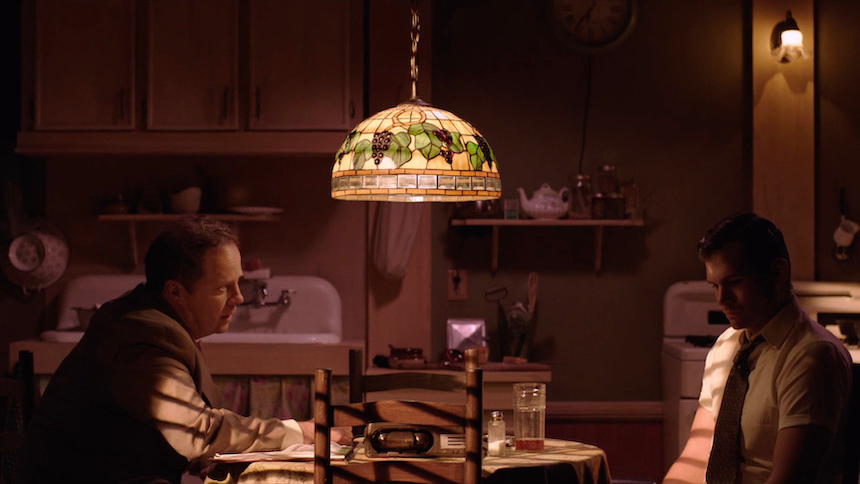Chattanooga 2023 Review: BRUTAL SEASON Brilliantly Melds Theater and Cinema
Gavin Fields wrote and directed the intense drama, starring Colleen Madden and Houston Settle.

Writer/director Gavin Fields’ feature debut Brutal Season opens with a narrator introducing the film’s soundstage setting, acknowledging the limitations, and asking viewers to believe in the world created by a small kitchen/dining room set.
The narrator informs us that our story takes place in Red Hook, Brooklyn in the summer of 1948. Then, one by one, we’re introduced to the players and their characters, as we see actors in single shots while we’re informed of their names and the names of their characters in voiceover.
The film begins when the final actor in that string stares directly into the camera for some time before walking through some backstage wiring and onto set and into the world of the film. Such an aggressively Brechtian introduction to your film is always a bold move, but here it’s more than a framing device.
The entirety of the film plays out on this single set, with few journeys to the hallway just outside the kitchen and dining room area. The first two acts of the film play out entirely in real time with characters coming and going, allowing the space to serve as a stage for several different conversation pairs and groups before ending with fades to black. The dialogue is purposefully stagey, as if the film were an adaptation of an existing play, rife with overly poetic musings about setting and characters’ relationships.
But even in that first act, Brutal Season is cinematic. Fields moves the camera with his characters through the small set, adjusts focus during conversations, and tightly frames faces during moments of intensity, alternating on whether the face we see filling the screen is speaking or listening and whether we’re seeing these faces head-on or in profile.
In an early moment, Gayle (Colleen Madden), mother of the central Trouth family, reminisces about past summers when the children would play with hose water to keep cool and the set’s “natural” light gives way to an intense orange spotlight on Gayle, as her surroundings darken and we see what looks like period accurate 16mm film of children playing in water played in the window of the apartment. It’s an effect that could be achieved in theater, but the way Fields shoots it makes it thrilling to see in film.
That sense of excitement about form, for both the creators and the audience, continues throughout the film. The end of the second act sees the camera outside the apartment set looking in on the starkly lit face of recently returned son Junior (Houston Settle). The third act sees the real time artifice of the first two give way to jumps in time between conversations with no introduction of how or when they started.
It’s an impressive magic trick to make theater cinematic in any context, whether it's a filming of a play or a cinematic adaptation of a work intended for theater. But Brutal Season is not an adaptation, it’s an original work that’s highly invested in the ways theater and cinema can be melded to create something excitingly new, rather than forcing one artform to meet the confines and demands of another.
That the content of the film, which sees Junior return home after a 12-year absence and quickly take the patriarch of the family to task for past misdeeds, is also engrossing only makes Brutal Season more exceptional. The entire cast brings the audience into their world, creating a sense of real people behind the heightened theatrical dialogue, and the story’s tensions and themes grow naturally. Questions of whether people can change and grow aren’t anything new, but Brutal Season engages with these questions meaningfully and, as many great films have done, centers an exciting tale of potential violence around those questions.
It’s a fantastic film that’s thrilling to watch for its story, but even more so for its form, and it makes me excited to see whatever Fields does next.
The film screened at the Chattanooga Film Festival.







